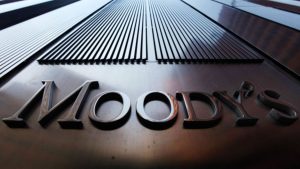National bank of Ukraine’s official rates as of 15/06/20

Source: National Bank of Ukraine

Moody’s Investors Service has upgraded the Government of Ukraine’s long-term issuer and senior unsecured ratings to B3 from Caa1. The outlook on the ratings is stable, Moody’s said in a report.
According to the report, the main driver of the decision to upgrade the ratings to B3 is the easing of Ukraine’s near-term funding challenges and the safeguards afforded to recent improvements in its external vulnerability as a result of the announced new financing programme with the International Monetary Fund (IMF)
The decision to upgrade the ratings also reflects Moody’s expectation that the new IMF programme will help anchor the reform progress achieved in recent years, Moody’s said.

Head of the Specialized Anti-Corruption Prosecutor’s Office (SAPO) Nazar Kholodnytsky has said that former U.S. Vice President Joe Biden and his son Hunter are not involved in the case of offering a bribe to the top officials of anti-corruption bodies for closing the episode, which involves former ecology minister Mykola Zlochevsky.
During a briefing on Saturday, asked about whether Hunter Biden is involved in the bribe criminal proceedings, since he is directly connected with Zlochevsky and Burisma Holdings, Kholodnytsky said: “Let’s put an end to this once and for all. Biden Jr. and Biden Sr. do not appear in this particular proceeding.”
Director of the National Anti-Corruption Bureau (NABU) Artem Sytnyk said that the bribe was offered for closing the episode regarding the stabilization loan, which was issued by the National Bank to Real Bank associated with Serhiy Kurchenko.
“Let’s not turn this matter into a political subtext,” Sytnyk said.

The Ukrainian government has made several decisions changing the entry requirements for foreign citizens and stateless persons, the country’s State Border Guard Service said on Saturday. Under the government decree No. 477, approved on June 12, the temporary entry ban for foreigners is no longer effective.
Another decree, No. 480, of June 12, requires foreigners to have a relevant insurance policy and those arriving from countries with high number of coronavirus infections to undergo observation.
For the duration of the quarantine, foreigners and stateless persons (except permanent residents, refugees, or persons seeking additional protection) will be banned from entry if they do not have an insurance policy (certificate) to cover the costs relating to COVID-19 treatment and observation, the decree said.
Arriving from, or being a citizen of, a country with a high number of COVID-19 cases shall be ground for observation, the government said.
“To ensure the transportation of persons from state border checkpoints to observation facilities, the government has compelled regional and Kyiv city state administrations,” the agency said.
At the same time, a citizen (subject) of a country with a high number of COVID-19 infections, who has not been in that country in the previous 14 days, foreign diplomats and consular officials, representatives from accredited international missions and organizations and their family members, drivers and crew members of cargo transport vehicles, air, sea and river crews, members of train and locomotive brigades, participants in an external independent audit (with one accompanying person each), will not be required to undergo observation, unless there is a reason to believe that they have been in contact with a COVID-19 patient.
Also exempt from observation will be those who agree to self-isolate using an act-at-home electronic service.
A country is considered to have a high number of COVID-19 cases if it had at least 40 active cases per 100,000 population.
A list of such countries will be updated and submitted by the State Border Guard Service to the Foreign Ministry every three days.
Therefore, foreign citizens and stateless persons may cross the Ukrainian border from the effective date of the Decrees No. 477 and No. 480, providing they have legal grounds for entry, as stipulated in the Ukrainian border control law, and observe sanitary epidemiological rules.

The Ukrainian President has established the Council of Experts on Energy Security, the press service of the National Security and Defense Council (NSDC) has reported.
“[NSDC Secretary Oleksiy] Danilov informed the audience that in order to ensure an effective response of the state to threats to energy security and identify strategic directions for the development of the state’s fuel and energy complex, taking into account the latest world trends, the President of Ukraine established the Council of Experts on Energy Security, which will be the highest advisory body for the Head of State and the National Security Council of Ukraine on energy issues,” the press service said.
Danilov said that to prepare recommendations for the Council of Experts and ensure its work, a working group on the development of the hydrogen economy has been set up at the Staff of the National Security and Defense Council of Ukraine.
“During the meeting, a number of measures were agreed to organize the effective work of the group in order to submit to the country’s leadership proposals for innovative approaches to the development of non-traditional energy sources,” the press service said.
The working group on hydrogen economy development should prepare and submit to the Council of Experts on Energy Security proposals on developing the hydrogen economy in Ukraine.
The NSDC Secretary stressed the urgency of developing the hydrogen economy: “This issue is extremely important in today’s world. Ukraine has great potential in this area, which we must use it.”
“Today we have specialists, resources, and investors. To get real results, we need to combine the efforts of science, business, and government,” he said.